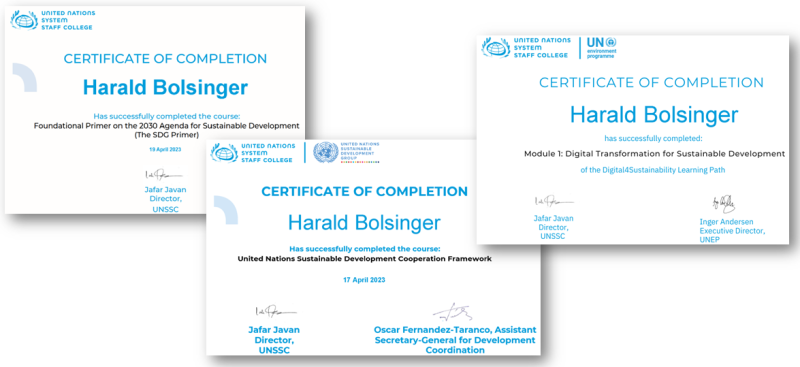Professional Values Management in Practice – Part II: Sustainability, digital transformation and a definition.
 After the last article on value management, I was approached with questions such as “Isn’t it enough to simply introduce sustainability? Aren’t there already enough values in sustainability management?” or “Do I need values management for successful digital transformation? Or is this purely a technological issue?!” Thank you for these important questions! The right answers to these questions are absolutely critical for success if sustainability and digitalisation are not to be just me-too projects without any differentiating power. Therefore, I would first like to give some fundamental hints on this, before explaining the individual steps in the value management cycle in further articles.
After the last article on value management, I was approached with questions such as “Isn’t it enough to simply introduce sustainability? Aren’t there already enough values in sustainability management?” or “Do I need values management for successful digital transformation? Or is this purely a technological issue?!” Thank you for these important questions! The right answers to these questions are absolutely critical for success if sustainability and digitalisation are not to be just me-too projects without any differentiating power. Therefore, I would first like to give some fundamental hints on this, before explaining the individual steps in the value management cycle in further articles.
In line with the questions, I took courses last week from the United Nations Environment Programme and the Sustainable Development Group at the United Nations System Staff College.
The professional content on sustainability and digitalisation is all based on the premise of strong values: in nations as well as in companies. Unfortunately, it is precisely this aspect that is given far too little attention in the UN courses! The same mistake that many companies make. In 2014, the United Nations made the connection between value foundations and sustainability extremely visible for the first time. On page 29 of the then preliminary drafted and world’s first “Global Sustainable Development Report 2015”, there is an illustration of how the personal definition of sustainable development is influenced by the underlying values set: What should be sustained and for how long? What should be developed, where and until when exactly? Answers to these questions are directly related to the internalised values of the decision-makers! The same applies to digitalisation, which is also subject to a completely value-driven dynamic. This is why we find fundamentally different approaches to regulating digitalisation in different cultural contexts: the USA, the EU and China, for example, are completely different – this is directly visible in data protection rules alone….
So when it comes to sustainability or digital transformation, the values of the most important stakeholders – at least the employees and customers – are absolutely relevant for success. It is therefore not primarily about ESG criteria, sustainability ratings, CSR measures and omni-channel approaches in full digital service, but about the values that really shape these topics from the perspective of the target group. Only when we know which KPV (Key Performance Values) are used for the understanding of digitalisation or the understanding of sustainability can we design suitable and, above all, functioning change projects that are also seen as goal-oriented, ambitious and credible. Anything else would be just another normatively demanded change from outside, which cannot create a sense of uniqueness and intrinsic meaning. It is therefore always about the people involved and their values! Discovering these and bringing them together in a professional process takes time! Participation and time are the most important ingredients in defining values, which ultimately lead automatically to a unique understanding of sustainability with its own focal points and to digitisation efforts in the areas perceived as important.
A good example of how values can shape a unique sustainability strategy is provided by Umweltbank AG. Based on only four core values and the resulting commitment to the Sustainable Development Goals, we developed and introduced clear investment criteria, financing principles, ratings for client investments and finally a unique “environmental guarantee”. In addition to the ideas of the employees and clients, those of the shareholders were of course also relevant. This is why the new preamble to the Articles of Association was adopted by an incredible 99% at a general meeting: “UmweltBank promotes the sustainable development of society with the aim of preserving and creating a world worth living in for future generations. In its business activities, the bank is guided by the United Nations Sustainable Development Goals. In particular, it contributes to the realisation of sustainable cities and communities, affordable and clean energy and climate protection. In doing so, it pays attention to sustainable production and consumption as well as gender equality. Honesty and transparency as well as people orientation are guiding values. A stable economic foundation is the prerequisite for successful work.”
This makes the bank the first in the world to commit to the United Nations’ understanding of sustainability in its entire core business and beyond. No wonder that this is considered state-of-the-art in the german speaking market and serves as a model for many others. With my involvement as Chairman of the Environmental Council, the necessary time was invested in this process and the intensive participation of the stakeholders was realised. No wonder, then, that we joined the Global Alliance for Banking on Values, where only “genuinely” value-oriented and credible do-gooders are accepted after an intensive review process.
So what is value management about? It’s about meaning and purpose, differentiation, community, participation and development! My definition, based on Erpenbeck, J. 2018, p. 4, therefore looks exactly like this after some practical experience:
Values management is the permanently institutionalized, regularly reflected and sustainable utilization of a specific values portfolio for the differentiated realization of an organization’s current sense of purpose.
As a system of targeted measures, values management identifies, reflects, changes, and implements or preserves a specific values portfolio in a targeted manner to promote the realization of a concrete corporate vision.
In its normativity-oriented function, values management makes particular use of discourse-ethical procedures to do justice to value dynamics at the individual, team-related, organizational and environmental levels and to respect people’s individual freedom.
Especially in the last paragraph of the definition, I differ from all other colleagues. I am firmly convinced that imposed values of third parties cannot produce any long-term effect. It is imperative to define a common foundation with respect for the ideas of all those involved, which can bring together the intrinsic motivation of all. Therein lies the power of a good common future – and this primarily ensures the successful implementation of the values!
In the next posts I will (finally :-)) go into the individual steps and your further questions – just send me an email if you want to know more …

